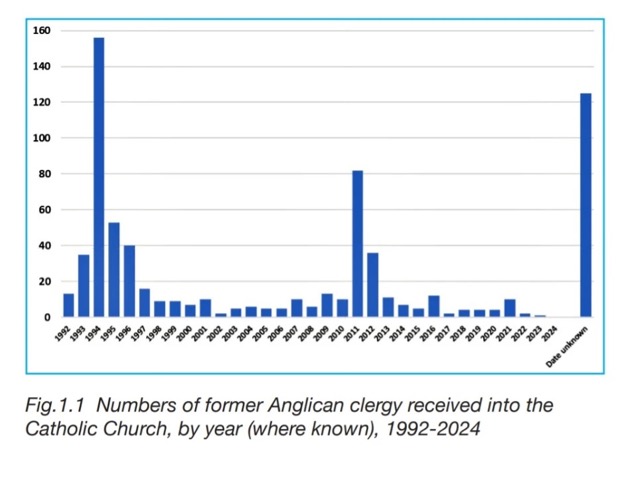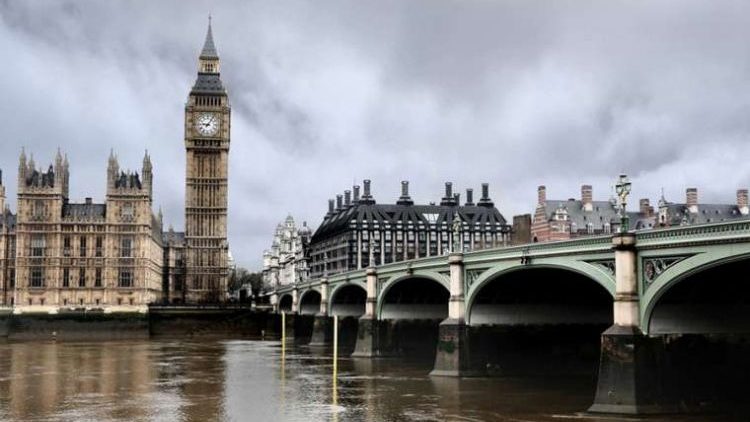A new report reveals that significant numbers of Anglican clergy have converted to Catholicism in the United Kingdom since 1992.
The report, “Convert Clergy in the Catholic Church in Britain," released Nov. 20, shows that approximately 700 clergy and religious of the Church of England, Church in Wales, and Scottish Episcopal Church have been received into the Catholic Church since 1992. The number includes 16 former Anglican bishops. This equates to approximately a third of all Catholic priests ordained in England and Wales during this period.
Speaking to CNA, co-author Stephen Bullivant, professor of theology and the sociology of religion at St. Mary’s Catholic University, London, said he was “really quite surprised” by the high numbers, “especially the [convert] ordinations as a proportion of all ordinations.”
“The numbers,” Bullivant added, “are much larger than most people would imagine. It was a much bigger phenomenon than a lot of people thought.”
He called the “steady stream” of former Anglican clergy converting “a very major source of Catholic vocations.”
Bullivant, who is also director of the Benedict XVI Centre for Religion and Society at St. Mary’s, identified two “big waves” as major factors in pushing Anglican clergy to convert.
First was the Church of England’s general synod vote in 1992, which enabled women to be ordained as vicars, and second the visit of Pope Benedict XVI to Britain in 2010. This high-profile visit was preceded by the apostolic constitution Anglicanorum Coetibus, which permitted the creation of “personal ordinariates for those Anglican faithful who desire to enter into the full communion of the Catholic Church in a corporate manner.”
The figures show a spike in the numbers after these events: Over 150 clergy entered into full communion with the Catholic Church in 1994, and more than 80 in 2011, the year after the papal visit, when the Personal Ordinariate of Our Lady of Walsingham was formally introduced. This ordinariate enabled former Anglicans to retain their Anglican heritage and customs when entering into full communion with the Catholic Church.
Explaining the moves prompted by these major events, Bullivant said: “You get this kind of big thing that forces the issue. There’s then strength in numbers because if there’s suddenly other people doing it, then it’s much easier to make it feel possible.”

The report was published by the St. Barnabas Society, which exists to support former clergy and religious of other Christian denominations and other world faiths. Its focus is on the numbers and experiences of former Anglican clergy who have become Catholic over the last 30 years.
The numbers were found by referring to “extensive records” from Monsignor John Broadhurst, a Catholic priest and former Anglican bishop, as well as Bullivant and his team interviewing 36 clergy and religious converts, which included three former bishops.
Responding to the numbers in the report, Cardinal Vincent Nichols, the president of the Catholic Bishops’ Conference of England and Wales, said: “It is fascinating reading, not only in its collating of facts and figures, but also in so many personal testimonies and insights.”
Nichols highlighted the experience of Anglicans entering into full communion with the Catholic Church as “not so much a turning away or rejection of their rich and precious Anglican heritage but an experience of an imperative to move into the full visible communion of the Catholic Church, in union with the See of Peter.”
The report contains accounts of clergy who have made the decision to become Catholic, which is described as “a step into the unknown.” Many have received practical help from the St. Barnabus Society. Bullivant said: “If it hadn't been for the St. Barnabas Society, [the conversions] couldn’t have happened.”
He also emphasized that the former Anglicans he interviewed were “very grateful for their Anglican period,” for the “background and what they learned from it and what it gave them.” He added: “They’ve looked at British Christianity from both sides now.”
“A lot of them are seeing [that] God had a plan for them. And part of that plan was for them to do this.”
He also highlighted the “substantial ongoing contribution to Catholic life made by convert clergy/religious in this country.”

